Lorem ipsum dolor sit amet, consectetur adipiscing elit. Ut elit tellus, luctus nec ullamcorper mattis, pulvinar dapibus leo.
We are pleased to announce the upcoming Children of Shingwauk Alumni Association (CSAA) Wellness Summit, taking place from Tuesday, October 15th to Thursday, October 17th, 2024, at Shingwauk Kinoomaage Gamig, Centre of Excellence in Anishinaabe Education in Sault Ste. Marie, Ontario.
Hosted by our Community Support Team, the summit will focus on wellness, healing, and community-building for former students of the Shingwauk and Wawanosh Indian Residential Schools, their families, and their communities. This event offers a meaningful opportunity to reflect, heal, and connect with others in a supportive environment.
Event Details:
Dates: Tuesday, October 15th – Thursday, October 17th, 2024
Location: Shingwauk Kinoomaage Gamig, Sault Ste. Marie, Ontario
Recommended Travel Dates: Monday, October 14th, and Friday, October 18th, 2024
We invite three delegates from each of our partner First Nations and organizations to attend: one Youth, a Support Worker, and a Survivor or Elder.
Please register by September 12th, 2024, to save your space and ensure your accommodations, which are covered by the event, are secured. Registration is limited, so please act fast!
Register here: www.csaa.live/areg
For any questions about the event or registration, please contact the event support team at events@ingaged.ca.
We look forward to welcoming you to this important event and continuing our collective journey toward wellness and healing.
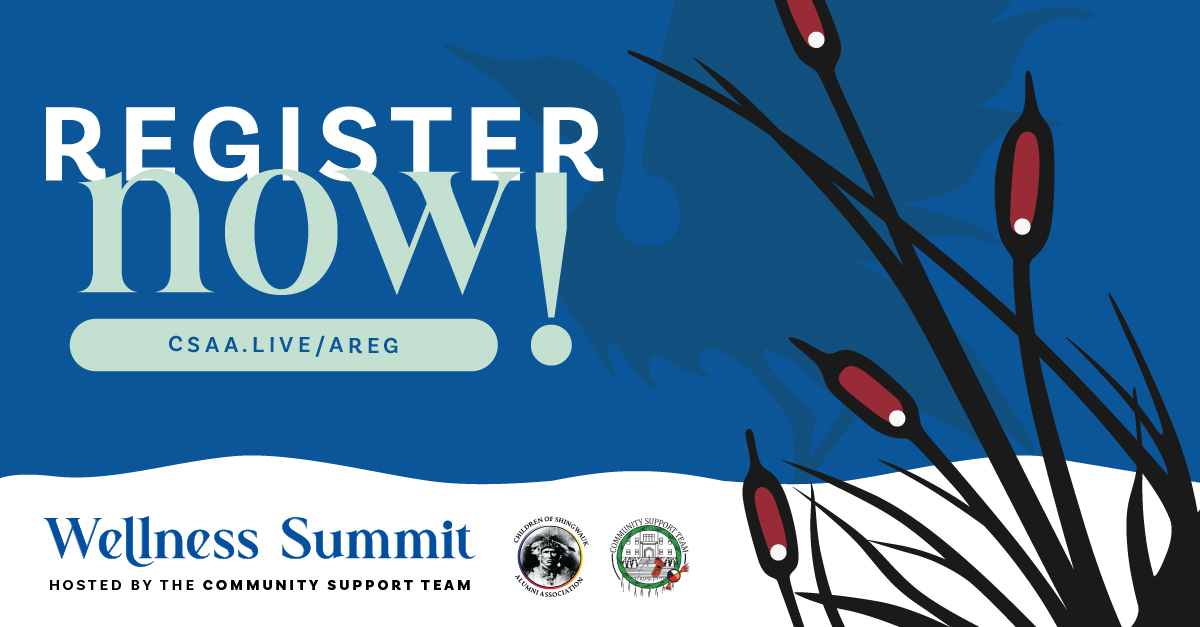
NORDIK Institute’s Annual Meeting 2024: Resilience and Renewal
Save the date!
NORDIK Institutes extends a warm invitation to you to attend our upcoming 2024 Annual Meeting. The theme of this event is Resilience and Renewal, with details as follows:
Date: Tuesday October 8, 2024
Location: Sault Museum, (Durham Gallery, 690 Queen St. E, Sault Ste. Marie, ON) and online
Time: 5:00pm-8:00pm
Cost: Free
The evening will highlight projects that have taken place throughout the 2023-2024 year, showcasing exemplary community-based initiatives through dialogue, discussion, and our relationships with our community partners. Come out and make a connection!
Agenda (Please find a link to detailed agenda here.)
5:00 pm Doors open
5:30 pm Dinner is served
6:00 pm Business meeting
6:45 pm Panel discussion
7:15 pm Poster presentations and networking social
8:00 pm Event ends
To attend this free event, please RSVP by October 1, 2024, here.
For more information, please contact Amy Boyer at amy.boyer@algomau.ca
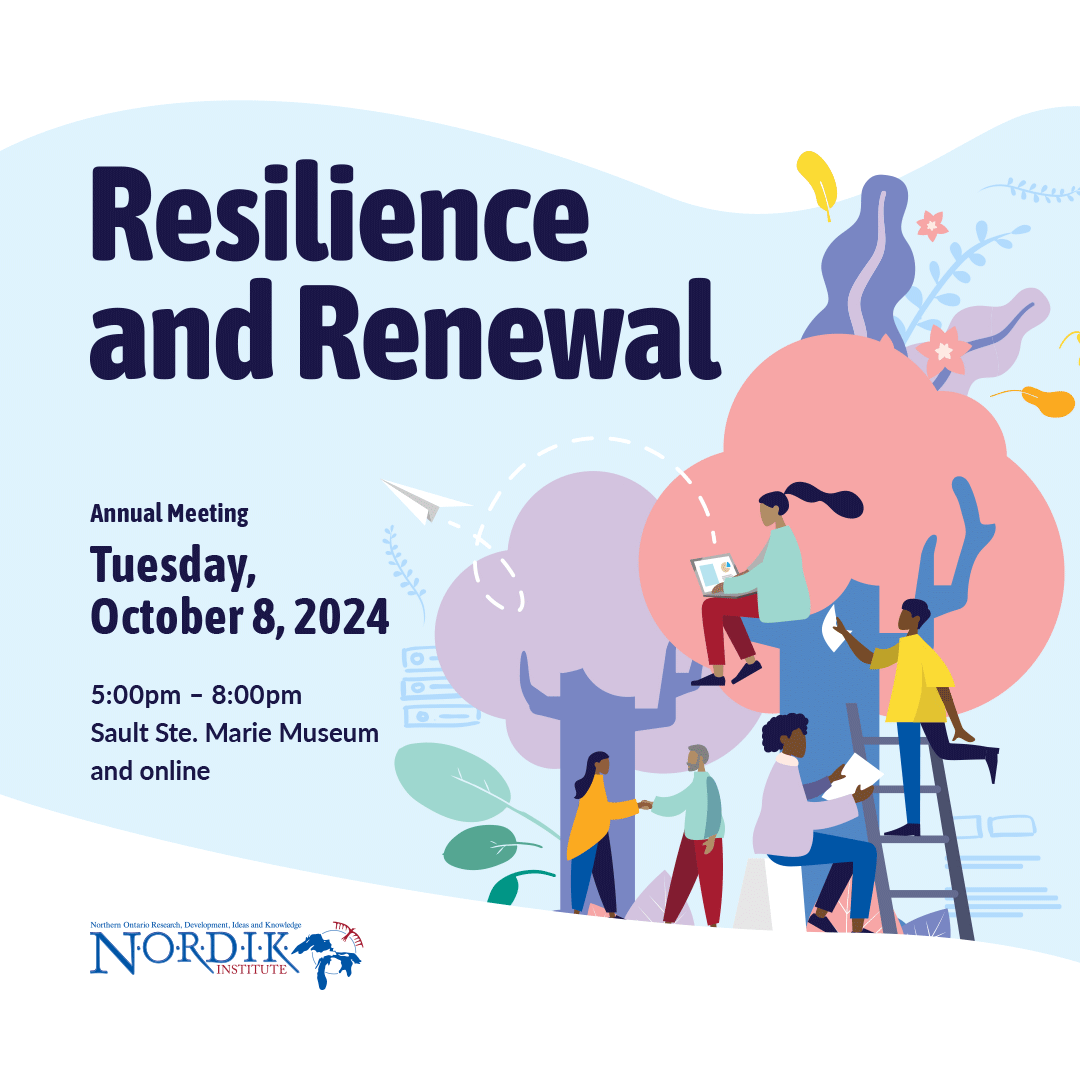
The Women Entrepreneurial Strategy (WES) has provided important investment in women who have business aspirations. The recent WES-funded report, The State of Women Entrepreneurship in Canada indicates that overall, many of the current offerings do not meet the needs of women, in general, and diverse women in particular. They also note that the majority of ‘mainstream’ business organizations’ offerings that are targeting equity-seeking founders are of limited utility as these organizations have not embraced policies and processes in overcoming systemic barriers within their operations.
The Women of Ontario Social Enterprise Network’s (WOSEN) answered the call for the development of effective women’s entrepreneurial supports by redesigning the ecosystem’s approach to creating and delivering programming and services while supporting organizations in moving towards centring equity. The project’s final report, Investing in Women Entrepreneurs: A case study for co-creating effective supports provides the sector with evidence-informed processes on ‘how to’ develop an equity-centric social entrepreneurship ecosystem. The initiative is contextualized within systems change and community economic development principles, offering a critical analysis of ways of effectively building, enhancing and expanding equity, and ‘how well’ strategies work — the impact and responses in addressing systemic barriers diverse women entrepreneurs encounter.
Dr. Jude Ortiz, NORDIK Institute’s Research Coordinator who led the Developmental Evaluation component of the project states, “WOSEN was intentionally grounded in a framework of equity-centred collaboration, principles-focused evaluation and social impact measurement. It engaged founders and ecosystem supporters in dynamic, collaborative and co-creative approaches that shifted mindsets, and built trust and capacity for investing in effective supports for women founders.”
WOSEN’s work reveals the significant role collaborative and co-creative processes contribute to building trust, shifting mindsets and identifying innovative equity-centred pathways forward. It illustrates ‘how to’:
WOSEN partners consider their collaborative and responsive approach a case study of a successful model for investing in women and creating the entrepreneurial infrastructure for them to prosper. They suggest that this model could be scaled to support others in advancing equity by building new paradigm capacity such as co-leadership, co-creation and emergent, reflective and participatory practices in developing resources, networks and pathways forward.
The collaborative supported 1,175 participants, residing in over 142 urban, rural and First Nation communities across Ontario and assisted women founders in unlocking $8.8 million dollars. WOSEN focused on women who have business solutions that put people and the planet first (i.e. social enterprises), and specifically those who were Indigenous, living in rural or remote regions, racialized, immigrants and/or living with disabilities. ‘Women’ includes genderqueer, two spirited, women-identifying individuals, and non-binary and gender non-conforming people. The terms ‘founders’ and ‘entrepreneurs’ included women who own or operate a small-medium sized business (SME) and those who are self-employed.
The report provides an overview of the key elements of each of the three catalyzing strategies for co-creating effective supports for diverse women entrepreneurs. Ten recommendations are presented for increasing investments in women founders through equity-centred collaboratives, partnerships and advocacy, and program diversity, flexibility and duration, to name a few.
WOSEN was a province-wide collaborative composed of five social innovation and system change organizations led by Pillar Nonprofit Network in partnership with NORDIK Institute, Social Innovation Canada, Social Venture Connexion and Flourishing Startups. WOSEN was funded in part by the Government of Canada through the Federal Economic Development Agency for Southern Ontario (FedDev Ontario).
Investing in Women Entrepreneurs is WOSEN’s third publication capturing the initiative’s collaborative learnings and impact. The first report, Outstanding By Standing Together, the Interim Report is available here, and the second report Centring Equity: Catalyzing system change through a collaborative, cogenerating knowledge network is available here.
To learn more about WOSEN, please visit https://wosen.pillarnonprofit.ca/.
The Children of Shingwauk Alumni Association (CSAA) is preparing for its Annual Gathering from August 4th – 7th, 2023. This year’s theme is Celebrating Our Footsteps: Our Journey. It will be a celebration of the milestones of the CSAA and Survivors, and sharing a vision for the future.
An open mic night is included, so feel welcome to bring your guitar, drum, favourite song to sing, or another special gift with our guests!
Travel reimbursement is available for alumni and family, as well as accommodation and meals provided throughout the Gathering.
Would you like to attend the event? Please register here.
Would you like to lend your time? To volunteer at this year’s Gathering, please contact Amy at amy.boyer@algomau.ca.
Would you like to sponsor or donate to the event? To offer your support, please contact Elaine at elaine.hotassone@algomau.ca.
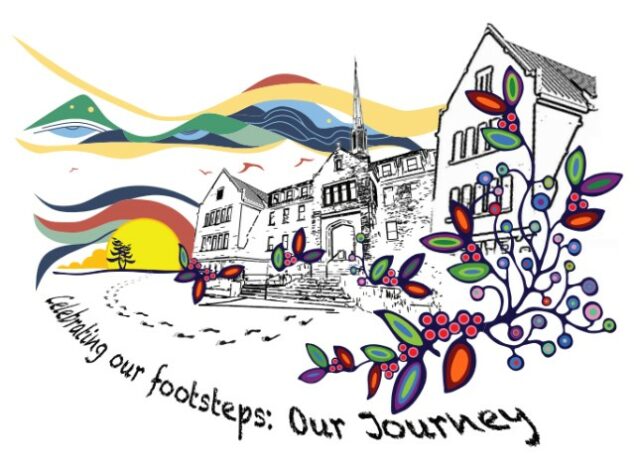
NORDIK Institute invites you to check out the Shingwauk Site Search Newsletter. In this first issue meet the Site Search team, find highlights from the 2022 Children of Shingwauk Alumni Association Gathering, and upcoming event announcements. It also includes the agenda of events for the National Day for Truth and Reconciliation: Orange Shirt Day on September 30th on the Algoma University – Sault Ste. Marie campus. Click Site Search Team News to read.
On September 30, 2022, NORDIK Institute will honour Residential school survivors, their families and communities by recognizing the National Day for Truth and Reconciliation: Orange Shirt Day. NORDIK Institute offices will be closed for the day to allow for our staff to take part in the events being held by Algoma University, virtually and on- campus.
The Sault Ste.Marie campus of Algoma University is hosting a full day of events. Beginning with a sunrise ceremony, flag raising, drop-in sharing circles with elder-in-residence Barbara Nolan, and in-person and virtual tours of the Shingwauk site. Some highlights include, the keynote speaker George Diamond, Project of Hearts community art activity, and a panel discussion on the Healing of Intergenerational Trauma. Concluding with the virtual Ontario Heritage Plaque unveiling, and drumming and round dance on the front lawn of the university. Find the full agenda here.
Shingwauk Kinoomaage Gamig’s Grand Opening is also happening on September 30th, beginning with a sunrise ceremony at 7:30 a.m. and official welcome at 9 a.m., and activities concluding by 4:30 p.m.. Find more information about this event here.
In a follow-up to the June visit of Indigenous and Afro-Colombian leaders to Ottawa and Northern Ontario, including a visit to Algoma University and Shingwauk Kinomaage Gamig, a delegation of Indigenous and Afro-Canadian leaders as well as allied counterparts and victims of the Colombian armed conflict exiled to Canada, was invited to the inauguration of President Gustavo Petro and Vice President Francia Marquez in Bogotá. The inauguration took place on August 7, 2022 and the Canadian delegation was invited on behalf of the Vice President, Francia Marquez.
While in Bogota, the delegation participated in a gathering at the residence of the Canadian Ambassador Marianick Tremblay, together with the visiting Parliamentary Secretary to the Minister of Foreign Affairs Maninder Sidhu, members of the Ethnic Commission for Peace and Defense of Territorial Rights. Delegates also met with Indigenous and Afro-Colombian members of the incoming government, including the new Ambassador to the United Nations, Leonor Salabata, a recognized Indigenous leader from the Arhuaca Nation. The delegation also participated in activities related to historical reparations for Black and Indigenous peoples as well as a meeting directed at building international solidarity hosted by both The Global Network – Ethnic People’s and Peace and The Black Alliance for Peace. Meetings centred on how Black and Indigenous peoples globally can work to strengthen direct governance and economic relationships among peoples, address critical issues such as poverty, land rights and climate change, and broaden spaces for dialogue and action in order to support efforts of the incoming government. The inauguration itself was an incredible testament to the power of social movements in the country who mobilized in an intensive effort to elect the Petro-Marquez formula, in a historic shift from an elitist government and policies that left rural, Indigenous and Afro-Colombian communities and territories in conditions of ongoing poverty and marginalization, displacement and violence directed against them. Today there is real hope for change.
Members of this Canadian delegation included Dr. Sheila Gruner Associate Professor at Algoma University, Chief Dean Sayers of Batchewana First Nation, Meredith Preston McGhie Secretary General of the Global Center for Pluralism, John Adeyefa President of the African Canadian Association of Ottawa (ACAO), Sahada Alolo Community Engagement Manager with the Multifaith Housing Initiative and member of ACAO, Godlove Ngwafusi Director, Equity and Anti-Racism Committee of the African Canadian Association of Ottawa, Pilar Riaño Professor of Social Justice at the University of British Columbia, Elizabeth Garcia Indigenous (Arhuaca) lawyer, researcher, social leader, and exiled victim of the armed conflict as well as other victims of the Colombian armed conflict exiled to Canada.
Chief Sayers had this to say upon reflection of his experience “I’m looking forward to continuing to work at this level on a Nation-to-Nation basis. This international exposure can only enhance the work that we’re doing on our lands here in proximity to Lake Superior with the Canadian and Ontario governments.”
“This visit meant for me the meeting of my two worlds”, began Elizabeth when thinking of what the delegation to Colombia meant for her. “There is certainty that there are no borders for solidarity and alliance building between peoples” (quote translated to English).
Professor Sheila Gruner emphasized the many parallels between Indigneous and Afrodiasporic thought and ways of being across the Americas, including the emphasis on “living well” with the Earth, within and across societies, reflected in a concept that the incoming Vice President articulated in her campaign as “vivir sabroso” (living well and enjoying life- until “dignity becomes the norm”) and “Ubuntu” (I am because we are). “There is a beautiful opportunity here related to reorienting the relationship between Canada and Colombia to emphasize what Algoma University has committed to, in way of decolonization, indigenization and diversity.”
Based on ongoing efforts to generate spaces for effective exchange between and among Indigenous, Afrodescendant and allied faculty and other counterparts, there will be an emphasis on higher education for communities historically marginalized and establishing routes to constructing a “complete peace” in Colombia. Algoma University, Shingwauk Kinomaage Gamig, NORDIK Institute and the new Faculty of Cross Cultural Studies have been invited to continue building in these areas.
For more information on the delegation or the work being done by those associated with the delegation, please contact/visit the following people/websites below:
Dr. Sheila Gruner – sheila.gruner@algomau.ca
The Global Network – https://nordikinstitute.com/research/ethnic-peoples-peace-global-network/
Shingwauk Kinomaage Gamig – https://shingwauku.org/
Batchewana First Nation – https://batchewana.ca/
The Global Network Ethnic Peoples and Peace Canadian Delegation along with Marianick Tremblay (Ambassador of Canada in Colombia) at the Presidential Inauguration
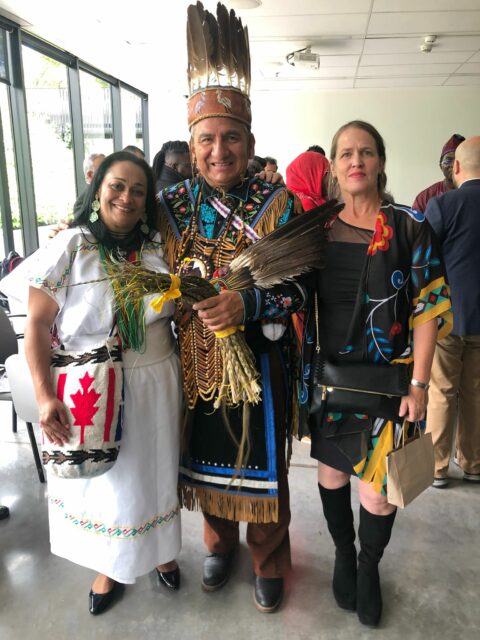
From Left to Right: John Adeyafa – President of the African Canadian Association of Ottawa (ACAO), Ingrid Garcia – Coordinator for the Canadian Chapter of the International Victims’ Forum, member of International Women for Peace and “We Defend the Peace”, Marianick Tremblay, Chief Dean Sayers of Batchewana First Nation, Meredith Preston McGhie – Secretary General of the Global Center for Pluralism, Elizabeth Garcia – Indigenous (Arhuaca) Lawyer, Dr. Sheila Gruner – Chair, Faculty of Cross Cultural Studies, Algoma University and Global Network, Sahada Alolo – ACAO, Godlove Ngwafusi – Director, Equity and Anti-Racism Committee of ACAO
Morning Prep for Inauguration
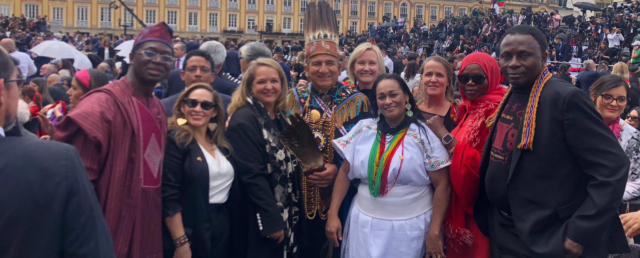
From Left to Right: Elizabeth Garcia, Chief Dean Sayers, and Dr. Sheila Gruner
Dr. Jude Ortiz of NORDIK Institute joins the International Advisory Board for a new project on cultural and creative industries in non-urban areas of the EU
Longstanding researcher with the NORDIK Institute, Dr. Jude Ortiz, has joined the International Advisory Board for a new major project exploring cultural and creative industries in Europe. The project “IN SITU – Place-based innovation of cultural and creative industries in non-urban areas” was launched on July 1, 2022, with a 48-month duration. Coordinated by the Centre for Social Studies at the University of Coimbra, Portugal, the €4 million project is funded by the European Commission under the Horizon Europe programme.
Despite the increased visibility and importance of cultural and creative industries (CCIs) based in non-urban areas of the European Union in the last decade, there is a noticeable lack of research and policy attention to their specific needs, characteristics, and potential. IN SITU brings together leading research approaches to economic evolution and diversification, processes of innovation, non-urban place-based planning, and entrepreneurship in CCIs. The project aims to contribute to increasing the capacity of CCIs to act as drivers of innovation, competitiveness, and sustainability in their local context.
IN SITU seeks to provide in-depth knowledge on the effects of cross-sectoral connections, innovative strategies and systems, and the needs of CCIs’ practitioners in non-urban areas, complementing this with proposals for cultural and innovation policies and frameworks. IN SITU includes also capacity-building programme to enable CCIs to address some of the key issues in their communities/regions.
The core defining aspect of IN SITU is the interlinking of research and practice through place-based IN SITU Labs – hubs for networking, capacity building, and monitoring case studies in six non-urban regions across Europe, located in Portugal, Ireland, Iceland, Finland, Latvia, and Croatia.
The project brings together 13 institutional partners in 12 countries: the Centre for Social Studies of the University of Coimbra (coordinator); National University of Ireland Galway (Ireland); European Network of Cultural Centres (Belgium); Utrecht University (Netherlands); National Institute for Agriculture, Food and Environment (France); MONDRAGON Innovation & Knowledge (Spain); Kultura Nova Foundation (Croatia); University of the Azores (Portugal); University of Turku (Finland); Latvian Academy of Culture (Latvia); Bifröst University (Iceland); National Academy of Theatre and Film Arts “Kr. Sarafov” (Bulgaria); and University of Hildesheim (Germany).The IN SITU project is also accompanied by an array of Outreach Partners within Europe and internationally: Culture Action Europe, DigitalMeetsCulture.eu, EMES – Research Network for Social Enterprise, Creative Scotland, United Cities and Local Governments – Committee on Culture, Cultural Development Network (Australia), Creative City Network of Canada, SPARC: Supporting Performing Arts in Rural and Remote Communities (Canada), and Sustaining Theatre and Dance (STAND) Foundation (South Africa).
In addition, the project has an International Advisory Board of seven leading international experts working on CCIs and culture-based work in non-urban areas. In addition to Dr. Ortiz, Algoma University, representing Canada, these experts include : Chris R. Gibson, University of Wollongong (Australia); Susan Luckman, University of South Australia (Australia); Avril Joffe, University of the Witwatersrand (South Africa); Patrick Brouder, Vancouver Island University (Canada); Tim Wojan, Oak Ridge Institute for Science and Education (ORISE) and National Science Foundation (United States); and Sylvia Amann, Inforelais (Austria).
For further information, please contact Nancy Duxbury (IN SITU Principal Investigator, Centre of Social Studies, University of Coimbra, Portugal) at duxbury@ces.uc.pt.
Registration is now open for the upcoming Children of Shingwauk Alumni Association Gathering “Remembering, Renewal and Moving Forward in 2022”. This year’s event is in-person, following all COVID-19 protocols.
There will be: Survivor, Family and Friends Talking Circles
Arrivals take place on Friday July 29th. The event begins with sunrise ceremony & ceremonial fire lighting on Saturday July 30th, followed by self-guided tours, a search site update, survivor presentations, church service & graveyard walk, and announcements about the Reclaiming Shingwauk Hall initiative.
Everyone who is interested is invited to attend. Register here: http://www.csaa.live/register
The July instalment of NORDIK Institute’s Spark Series will feature Dr. Rose Ann Torres, from Algoma University’s School of Social Work. The presentation will take place via Zoom on Wednesday, July 27th at 12 p.m. Click the link at the bottom of this page to register.
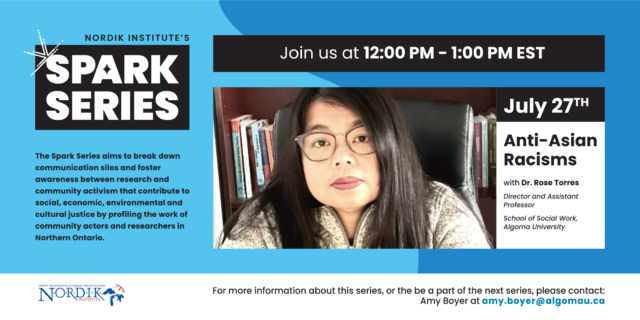
In Dr. Torres’ presentation, she argues that white supremacy is fundamental to the formation of the Canadian nation and the rise of the post-war welfare state. In other words, does the category of “Asians” even exist when Asians are considered the disordered other? This presentation looks outside the shaping of whiteness and to start asking ethical question of how Asians may look within and without communities in the diaspora. To do this, this presentation discusses and deliberates the history of anti-Asian racism. Including Dr. Torres’ initial research findings on the experience of Filipino health care workers in Northern Ontario during the COVID-19 pandemic and the different ways in which we can re-imagine Asians from a place of disorder.
Dr. Rose Ann Torres is the Director and Assistant Professor in the School of Social Work at Algoma University. She is currently a Visiting Professor at the Polytechnic University of the Philippines. Prior to joining Algoma University, she was an Assistant Professor at University of New Brunswick. Dr. Torres is currently the principal investigator of “Examining Access to Mental Health Care Service: The Impact of Covid-19 on Filipino Health Care Workers in Northern Ontario” and a co- principal investigator (with Dr. Nyaga) for a SSHRC funded project entitled: “Effects of COVID-19 on Teaching, and Learning: Stories of Indigenous and Racialized Faculty Members and Students at Algoma University. She co-edited two books on “Asian Canada is Burning: Theories, Methods, Pedagogies, and Praxes” with Fernwood Publishing (Forthcoming) and “Critical Reflexive Research Methodologies with University of Calgary Press” (Forthcoming).
The Spark Series aims to break down communication silos and foster awareness between research and community activism that contribute to social, economic, environmental and cultural justice by profiling the work of community actors and researchers in Northern Ontario.
Register for this event here: https://www.eventbrite.ca/e/nordik-spark-series-anti-asian-racisms-with-dr-rose-ann-torres-tickets-379211912037
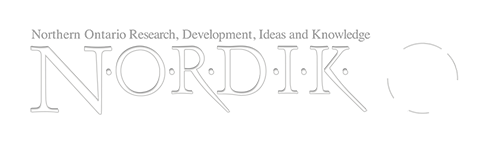
1520 Queen St. East
Sault Ste. Marie
P6A 2G4
Copyright © 2021. NORDIK Institute. Privacy Policy